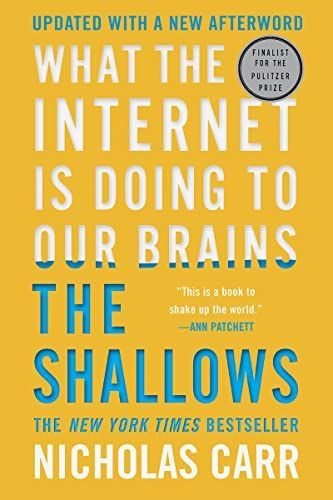What the Internet is Doing to our Brains - The Shallows by Nicholas Carr

I am using the style that the brilliant Ali Abdaal uses here.
This book is a continuation of Nicholas Carr's article in the Atlantic titled Is Google Making Us Stupid?
In the article, Carr states that "I can feel it, too. Over the past few years, I’ve had an uncomfortable sense that someone, or something, has been tinkering with my brain, remapping the neural circuitry, reprogramming the memory. My mind isn’t going—so far as I can tell—but it’s changing. I’m not thinking the way I used to think."
Carr references Scott Karp, who writes a blog about online media. Karp "recently confessed that he has stopped reading books altogether. “I was a lit major in college, and used to be [a] voracious book reader,” he wrote. “What happened?” He speculates on the answer: “What if I do all my reading on the web not so much because the way I read has changed, i.e. I’m just seeking convenience, but because the way I THINK has changed?”
"The insights that Carr shares are not just surprising – they are essential to understanding how our brains, and the human condition, are changing. Despite the provocative title, however, Carr’s conclusion is not that the internet is an evil behemoth that is corrupting our minds. Instead, he simply provides some clarity about the sacrifices we make by using the Internet as we do and advocates that we consider those losses along with the benefits that the internet provides." - from here
It made me think about this quote "If you're not paying for the product, you are the product" (I am not sure who to attribute it to). After reading Carr's work I am reminded that the internet is not evil, instead, it is extremely useful, but this comes at a cost - a cost that if we are not careful could cost us dearly.
🚀 The Book in 3 Sentences:
1) The internet, while an incredible tool, impacts our ability to focus.
2) The Internet makes us process vast amounts of information, which causes burnout.
3) We must give ourselves time away from the internet to focus and rejuvenate.
🎨 Impressions and how the book changed me:
I enjoyed this book. It provided a great overview of the history of the internet and an in-depth analysis of the impact of the internet on our lives. It delved into the detrimental effects of the internet on our physical and mental health. Despite the many benefits of the internet, it argues that prolonged use is fundamentally changing the neurological structures in our brains for the worse: leaving us stressed, anxious, tired, and unable to focus.
✍️ My Top 5 Quotes:
“The Net’s interactivity gives us powerful new tools for finding information, expressing ourselves, and conversing with others. It also turns us into lab rats constantly pressing levers to get tiny pellets of social or intellectual nourishment.”
― Nicholas G. Carr, The Shallows: What the Internet is Doing to Our Brains
“We become, neurologically, what we think."
― Nicholas Carr, The Shallows: What the Internet is Doing to Our Brains
“In the quiet spaces opened up by the prolonged, undistracted reading of a book, people made their own associations, drew their own inferences and analogies, fostered their own ideas. They thought deeply as they read deeply.”
― Nicholas Carr, The Shallows: What the Internet is Doing to Our Brains
[Patricia Greenfield] concluded that “every medium develops some cognitive skills at the expense of others.” Our growing use of the Net and other screen-based technologies has led to the “widespread and sophisticated development of visual-spatial skills.” We can, for example, rotate objects in our minds better than we used to be able to. But our “new strengths in visual-spatial intelligence” go hand in hand with a weakening of our capacities for the kind of “deep processing” that underpins “mindful knowledge acquisition, inductive analysis, critical thinking, imagination, and reflection.”
― Nicholas G. Carr, The Shallows: What the Internet is Doing to Our Brains
We want to be interrupted because each interruption brings us valuable pieces of information. To turn off these alerts is to risk feeling out of touch, or even socially isolated.”
― Nicholas Carr, The Shallows: What the Internet is Doing to Our Brains
🧭 How I Discovered It:
My wife recommended this book as it is part of some of her required reading for university.
👤 Who Should Read It?
I think that it's an important read for parents and adolescents.
If you'd like to read more of my Book Summaries, you might find these interesting.
You can get a copy here: https://bit.ly/3Xa7cLh
